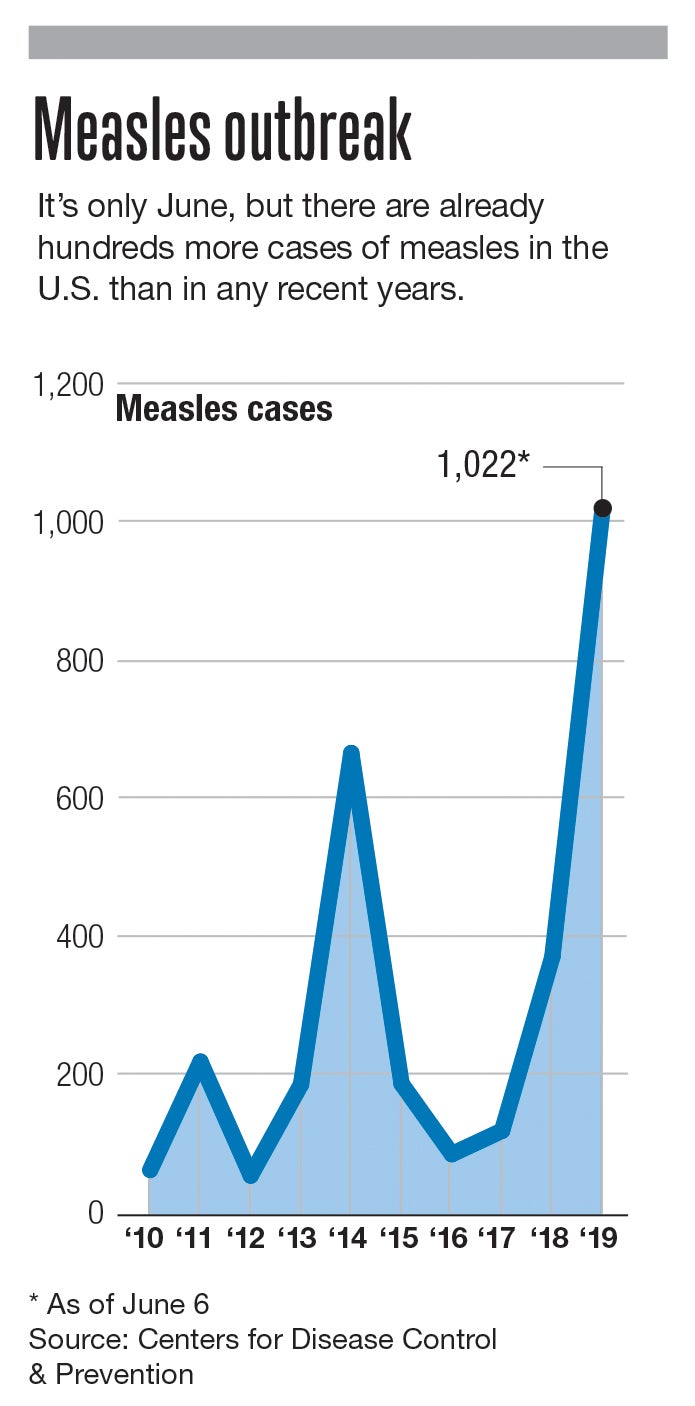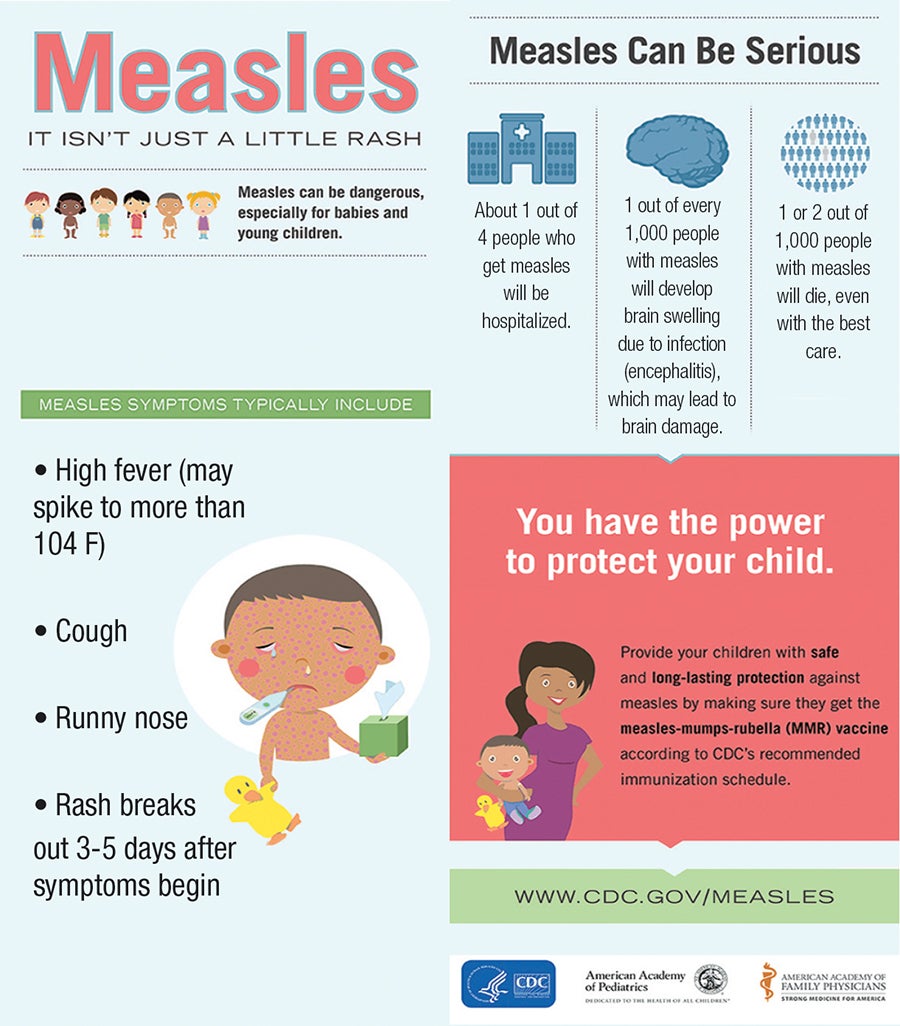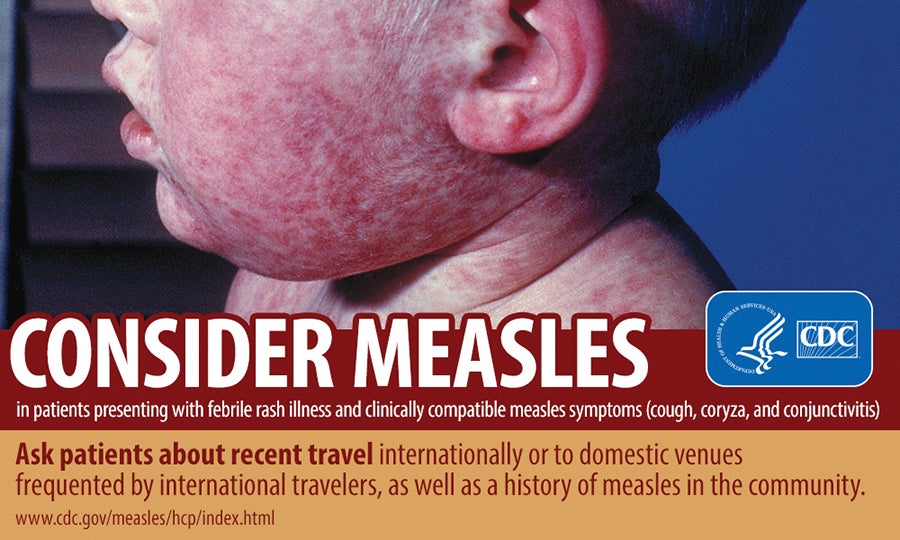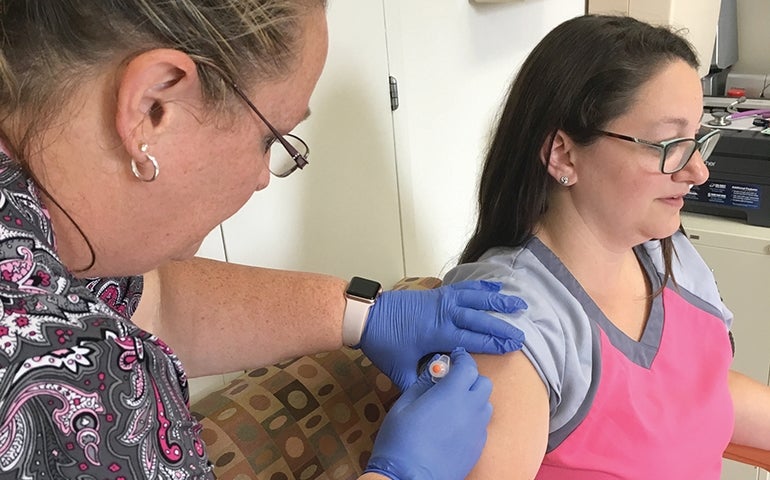Though the disease was declared eliminated in the United States in 2000, measles is making a comeback in the country, with this year bringing the highest number of cases since 1992.
Largely due to fewer people being vaccinated against the disease, measles outbreaks have happened in New York, Pennsylvania, California and Washington, according to the Centers for Disease Control & Prevention, with 1,022 cases reported in 26 states. Yet, only two of those cases happened in Massachusetts, and medical professionals in Central Massachusetts are hopeful with vigilance and education, they can stop the spread of the disease here.
“I’m hopeful we won’t have an outbreak, but I wouldn’t be surprised if we have more cases,” said Dr. Larry Madoff, infectious disease specialist and professor at UMass Memorial Medical School in Worcester.

Measles is a highly contagious disease with flu-like symptoms and can be fatal, particularly to children under age 5. It can be prevented with a vaccine, and nearly all the cases in the U.S. are from people who weren’t vaccinated against it or didn’t know if they received the vaccination.
“A single person can infect everyone who shares the same air,” Madoff said. “The virus can stay in the air up to an hour after that person has left.”
Due to the contagiousness and the state’s proximity to New York, healthcare providers in New England are on high alert. Rockland County in New York has reported 255 cases, and New York City has had 550 reported cases.
Logan International Airport in Boston poses another risk, as foreign populations are less likely to be vaccinated against the disease and could come from places like Israel, Ukraine, and the Philippines, where large measles outbreaks are occurring, according to the CDC.
“It’s quite possible we could get an outbreak in Massachusetts,” said Dr. Vibha Sharma, chief of infectious diseases at UMass Memorial – Marlborough Hospital.
Highly preventable
Though measles is easily spread, Sharma said, the disease is highly preventable.
“We are lucky to have a safe and very effective vaccine,” Madoff said.
MMR is a live viral vaccine containing modified strains of measles, mumps, and rumbella in order to create immunity and prevent infection.
“There is nothing else really in terms of prevention,” Sharma said.
Though MMR is extremely effective and the only way to truly avoid contracting measles, some still might choose to not get the vaccine, Sharma said.
People who choose not to get the vaccine are worried about side effects, believe in natural immunity, or are part of a population that cannot get it. It is a live vaccine and cannot be given to immuno-compromised people or pregnant women, Sharma said.
“You have to respect people’s choices,” she said.
Yet, Madoff said, unless you are part of a population that cannot get the vaccine, there is no reason not to get it.
“There is a lot of misinformation about MMR not being a safe vaccine,” he said, saying data proves there is no connection between MMR and autism, which is a often-cited concern of people who decline available vaccinations.
Whether or not one gets the vaccine is a decision that affects other people as well, Madoff said.
“Vaccine prevents you from getting it but also prevents you from spreading it,” he said.

Herd immunity
One case of measles can cause hundreds of others, said Dr. Alwyn Rapose, infectious disease specialist at the Reliant Medical Group in Worcester.
“It is highly contagious. Hence if there is a large number of persons in Massachusetts who are not immune, this infection will spread very fast as an outbreak,” Rapose said.
On the other hand, if a large percent of a population is vaccinated, they protect those that cannot be. This is thought of as herd immunity.
Massachusetts has high rates of vaccination. Madoff said 98% of kindergarteners in Massachusetts have been vaccinated.
Other than pockets in Western Massachusetts and the Berkshires, the state has a form of herd immunity and, therefore, is strong in preventing an outbreak of measles, he said.
One aspect of Worcester medical professionals have to account for is the large population of immigrants who might not have had access to MMR before immigrating to the United States.
“We have to check up on immunization records when anyone immigrates,” said Dr. Abigail Matthews, assistant director at Edward M. Kennedy Community Health Center in Worcester.
Having high rates of immunization is an important part of preventing Worcester from having an outbreak, and this includes making sure everyone living in Central Massachusetts who is able has received MMR.
Refugees and immigrants are put through a strict medical structure of testing and care, Matthews said. This allows for check-up vaccinations for those who did not get MMR when they were a child.

Other precautions
The most prominent way to prevent an outbreak is through being vaccinated. Yet, there are other precautions, such as limiting travel and isolating those showing symptoms of measles, Sharma said.
“We need a multifaceted approach to outbreaks,” she said.
Even though Massachusetts has had very few cases, the existence of any measles outbreak nearby gives a good reason for medical professionals to evaluate the state’s population for updated vaccinations and immunity status, Rapose said.
School nurses have been a vital part of preventing measles in Massachusetts, Matthews said. Reporting these records to the CDC allows the state as a whole to better prevent an outbreak.
“I want to highlight how school nurses have been doing a great job of tracking vaccination record,” she said.
Health professionals are optimistic Massachusetts is immune enough to handle measles, but it is always important to take the necessary precautions.
Whether it be making sure you’ve been vaccinated, being very selective and careful when traveling, or isolating yourself and others experiencing symptoms, measles is highly preventable if the right steps are taken, Sharma said.

